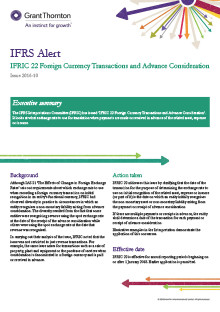-
Sector Focus
We specialise in the investment management industry offering audit, assurance, tax and corporate recovery and liquidation services.
-
Personal Tax Services
There are many tax rules that can affect you personally and therefore which will have an impact on your personal wealth.
-
QI Compliance
Qualified Intermediaries (QI) have to take action now to perform a Certification to the Internal Revenue Service (IRS).
-
Download our tax brochures
The tax teams at Grant Thornton aim to provide the Channel Islands with a premier tax advisory service both to private clients and the business community including the investment management industry.
-
Jersey Tax Return
A secure sign in page to file Jersey Tax Returns through the Grant Thornton tax portal.
-
ESG
ESG can either be seen as a risk management tool or an opportunity, either way it is imperative to your business, whatever your size and whether you are listed or not.
-
Professional Services
Business and accounting support for professional services
-
Finance Industry
We work with a broad range of clients and their financial stakeholders, from entrepreneurs in the early days to fast growing and established businesses to public companies competing in global markets.
-
Local Businesses
Businesses come in many shapes and sizes – from innovative start-ups to long-established local businesses. But however large or small your business, the chances are you face similar challenges.
-
Corporate Insolvency
Our corporate investigation, Guernsey liquidation and recovery teams focus on identifying and resolving issues affecting profitability, protecting enterprise value and facilitating a full recovery where possible.
-
Corporate Simplification
Redundant corporate entities can over complicate group structures and waste thousands of pounds in unnecessary costs each year. 46% of the c.15,500 companies controlled by the FTSE100 are dormant and it is estimated that the average cost of administering dormant companies is between £3,500 and £5,000 per company, per year.
-
Debt Advisory
Our Debt Advisory team provides commercial and financial debt advice to corporate entities and public sector bodies in a range of sectors. Our engagements include advice on stand-alone transactions and solutions or as part of an integrated business plan, in both the project and corporate arenas.
-
Exit Strategy Services
We offer a tailored methodology designed to enable a company to be reviewed in a group context to assess ways to maximise its value.
-
Financial Restructuring
For companies challenged by under-performance we work with management teams, shareholders, lenders and other stakeholders to implement financial restructuring solutions creating a stable platform for business turnaround.
-
Strategic performance reviews
Strategic performance reviews analyse the key drivers of performance improvement. Our specialists utilise a framework to evaluate financial and operational options and to identify solutions for businesses and their stakeholders.
The IFRS Interpretations Committee (IFRIC) has issued ‘IFRIC 22 Foreign Currency Transactions and Advance Consideration’. It looks at what exchange rate to use for translation when payments are made or received in advance of the related asset, expense or income.
Background
Although IAS 21 ‘The Effects of Changes in Foreign Exchange Rates’ sets out requirements about which exchange rate to use when recording a foreign currency transaction on initial recognition in an entity’s functional currency, IFRIC had observed diversity in practice in circumstances in which an entity recognises a non-monetary liability arising from advance consideration. The diversity resulted from the fact that some entities were recognising revenue using the spot exchange rate at the date of the receipt of the advance consideration while others were using the spot exchange rate at the date that revenue was recognised.
In carrying out their analysis of the issue, IFRIC noted that the issue was not restricted to just revenue transactions. For example, the same issue arises for transactions such as a sale of property, plant and equipment or the purchase of services when consideration is denominated in a foreign currency and is paid or received in advance.
Action taken
IFRIC 22 addresses this issue by clarifying that the date of the transaction for the purpose of determining the exchange rate to use on initial recognition of the related asset, expense or income (or part of it) is the date on which an entity initially recognises the non-monetary asset or non-monetary liability arising from the payment or receipt of advance consideration.
If there are multiple payments or receipts in advance, the entity shall determine a date of the transaction for each payment or receipt of advance consideration.
Illustrative examples in the Interpretation demonstrate the application of this consensus.
Effective date
IFRIC 22 is effective for annual reporting periods beginning on or after 1 January 2018. Earlier application is permitted.

